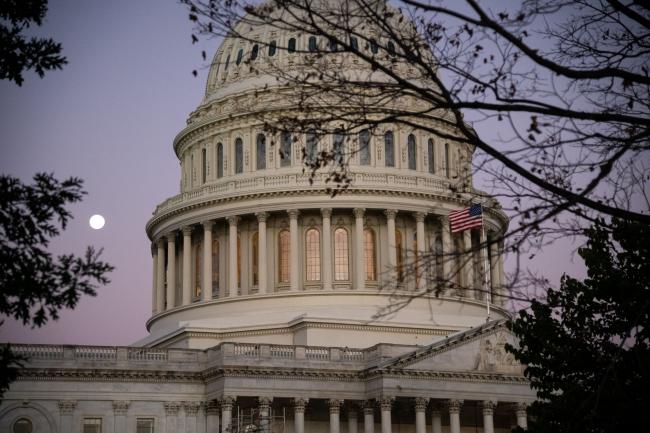(Bloomberg) -- After Democrats spent the last two years pushing, with some success, to raise business taxes, they could end up striking a deal with Republicans by year-end on a roughly $100 billion tax-cut package.
Republicans -- who are expected to control the House as of January -- want tax breaks for private equity, manufacturers and businesses. For their part, Democrats want to expand the child tax credit, using their final weeks controlling both congressional chambers to reinstitute a policy they see as critical to reducing child poverty.
In the wake of a bruising midterm election campaign, it’s unclear whether the two sides can secure a compromise. Failure would see interests harmed on both sides, an augur for an all the more tense alignment in Congress once the two chambers have divided control next year.
Practically, an agreement depends in part on Democrats scaling back their original goal of nearly doubling the current $2,000-per-child credit and paying it in monthly installments.
Democrats could secure a more modest child tax credit in return for extending the soon-to-expire business tax breaks that Republicans support -- affecting research and development costs, investment deductions and debt write-offs. The resulting package would benefit a swath of stakeholders ranging from private equity firms and pharmaceutical companies to the parents of young children.
Dell Technologies (NYSE:DELL) Inc., Ford Motor (NYSE:F) Co. and Netflix Inc (NASDAQ:NFLX). have urged lawmakers this month to reach a deal on the research benefit, which they say will cost jobs if it is allowed to lapse.
“There’s going to be a clear debate about tax choices, and this whole debate about child tax credit is front and center on that discussion,” Senate Finance Committee Chairman Ron Wyden told reporters on Tuesday, adding that he’d also support some business tax breaks in a larger package.
Any year-end deal could be the most significant tax legislation for years to come, since a Republican House majority would be unlikely to engage with the Biden administration on legislative priorities.
While the party controls both chambers until the new Congress sits, Democrats will still need at least 10 Republican votes in the Senate for any deal to pass, given the filibuster.
Democrats’ opening offer was to revive the 2021 credit that boosted the tax break to as much as $3,600 per child and distributed it in monthly payments -- a proposal that costs more than $1 trillion over a decade. They would have to settle for a much lower benefit to get enough GOP support for an agreement.
“Republicans are laughing Democrats out of the room with their child tax credit demand,” said Evercore ISI analyst Tobin Marcus, who served as an adviser to Joe Biden when he was vice president. “I only see Democrats hardening that demand with each public pronouncement.”
A more realistic price tag for the child tax credit would be in the same range as the $45 billion worth of tax cuts that Republicans are seeking. Even though this is a far cry from progressives’ initial plans to transform the credit into a new social program, some Democrats recognize they will have even less leverage next year. This means that December is the best shot for lawmakers of both parties to address key tax priorities that will run out unless Congress revives them.
The four big-dollar tax issues at the center of the debate are:
- The expansion of the child tax credit after Democratic advocates were unable to include it in the Inflation Reduction Act.
- Reviving a version of the deduction for R&D costs that allows companies to reduce tax liability in the same year they incur the spending. This would benefit manufacturers, drugmakers and tech companies.
- Reinstating a more generous deduction for interest expense writeoffs that expired at the end of 2021. This would benefit highly leveraged companies, including private equity and venture capital firms.
- Renewing a tax break known as “bonus depreciation” that allows businesses to write off their equipment purchases in a single year, benefiting companies with large capital expenditures.
Congress is also finalizing an overhaul to legislation on retirement that would make a series of changes to expand savings -- such as boosting automatic contributions for retirement plans and encouraging small businesses to provide retirement benefits. A version of this legislation passed the House with bipartisan votes earlier this year and has support from both Democrats and Republicans in the Senate.
Ways and Means Committee member John Larson said Tuesday whether a tax deal happens depends on whether it can be packaged with other priorities, such as the retirement-security bill. The Democrat also mentioned raising the debt ceiling to protect Social Security from being cut next year by the GOP.
After the possible year-end tax deal, a divided Washington will likely spend the next two years talking about taxes, without much action.
Republicans are set to push legislation from Representative Vern Buchanan of Florida to extend former President Donald Trump’s 2017 tax law, much of which expires in 2025. They are also eager to investigate the Internal Revenue Service, particularly the agency’s plans for the $80 billion in funding from the Inflation Reduction Act to bolster enforcement over the next decade.
But such initiatives would be bound to die in the Democrat-controlled Senate, even before Biden had the chance to veto them.
“The easiest thing to do is talk,” said John Gimigliano, who manages tax policy issues for accounting firm KPMG. “Extending the Tax Cuts and Jobs Act, IRS oversight, IRS funding -- what are they actually going to do about it, especially because it needs to go through the White House?”

